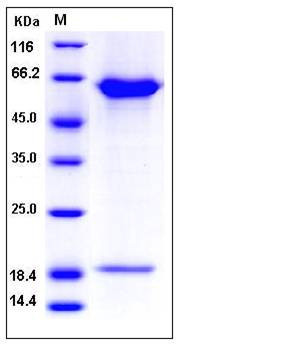Rat PCSK9 / NARC1 Protein (His Tag)
NARC-1, Narc1, PC9, Pcsk9
- 100ug (NPP1563) Please inquiry
| Catalog Number | P80005-R08H |
|---|---|
| Organism Species | Rat |
| Host | Human Cells |
| Synonyms | NARC-1, Narc1, PC9, Pcsk9 |
| Molecular Weight | The secreted recombinant pro form of rat PCSK9 comprises 672 amino acids and predicts a molecular mass of 72.8 kDa. As a result of glycosylation and proteolytic digestion, rat PCSK9 migrates as doublet with apparent molecular mass of 20 kDa and 62 kDa corresponding to the pro domain and mature form respectively in SDS-PAGE under reducing conditions. |
| predicted N | Gln 31 |
| SDS-PAGE |  |
| Purity | > 97 % as determined by SDS-PAGE |
| Protein Construction | A DNA sequence encoding the rat PCSK9 (NP_954862.2) (Met 1-Gln 691) was expressed, fused with a polyhistidine tag at the C-terminus. |
| Bio-activity | 1. Measured by its ability to bind biotinylated human LDLR in a functional ELISA . 2. Measured by its ability to bind biotinylated mouse LDLR in a functional ELISA. |
| Research Area | Developmental Biology |Metabolism |Pathways and Processes |Metabolic signaling pathways |Lipid and lipoprotein metabolism |Lipid metabolism | |
| Formulation | Lyophilized from sterile PBS, pH 7.4 1. Normally 5 % - 8 % trehalose, mannitol and 0.01% Tween80 are added as protectants before lyophilization. Specific concentrations are included in the hardcopy of COA. |
| Background | Proprotein convertase subtilisin/kexin type 9 (PCSK9), also known as NARC1 (neural apoptosis regulated convertase), which is a newly identified human secretory subtilase belonging to the proteinase K subfamily of the secretory subtilase family. PCSK9 protein is an enzyme which in humans is encoded by the PCSK9 gene with orthologs found across many species. It is expressed in neuroepithelioma, colon carcinoma, hepatic and pancreatic cell lines, and in Schwann cells. PCSK9 protein is highly expressed in the liver and regulates low density lipoprotein receptor (LDLR) protein levels. Inhibition of PCSK9 protein function is currently being explored as a means of lowering cholesterol levels. Thereby, PCSK9 protein is regarded as a new strategy to treat hypercholesterolemia. PCSK9 protein contributes to cholesterol homeostasis and may have a role in the differentiation of cortical neurons. |
| Reference |
